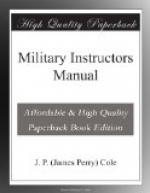Lieutenants remain in file closers.
At command, Officers Center, Captains remain at their posts with their Companies.
REGIMENTAL REVIEW.
Regiment formed in line or line of masses.
Colonel commands: Pass in Review.
Each Major commands: 1, Squads Right; 2, March.
If in line of masses, Colonel commands: “Pass
in Review.” Major of
Right Battalion commands: Column of Squads,
First Company Squads,
Right, March.
FIRE DIRECTION IS THE FUNCTION OF
THE CAPTAIN AND HIGHER
COMMANDERS. ABOVE THE GRADE
OF CAPTAIN AND DIRECTION IS
PRINCIPALLY TACTICAL. WITH
A CAPTAIN IT IMPLIES THE ABILITY TO
ISSUE CORRECT FIRE ORDERS TO MEET
GIVEN SITUATIONS IN ORDER
THAT THE FIRE OF THE COMPANY MAY
BE AS EFFECTIVE AS POSSIBLE.
FIRE CONTROL IS THE COMBINED PRODUCT
OF THE FIRE UNIT
COMMANDERS AND THE FIRERS.
THE FIRE UNIT IS THE PLATOON.
FIRE DISCIPLINE MEANS STRICT ATTENTION
TO THE SIGNALS AND
ORDERS OF THE COMMANDER, AND IS
THE FACULTY DEVELOPED IN THE
MEN BY INSTRUCTION AND TRAINING,
OF COMMENCING, CEASING, OR
DIMINISHING FIRE, OR OF CONCENTRATING
IT UPON A DEFINED OBJECT
IN OBEDIENCE TO THE DELIBERATE WILL
OF THE COMMANDER.
NOTE.—It is to be remembered that all grades of commanders are supposed to be familiar with the duties of all below them.
In issuing orders all Officers, in addition to announcing where they will be found will give the location of the next higher Commander.
The authorities for statements under the Platoon Leader and below are not given after each statement but the paragraphs from which they are deduced are given under the heading for each grade. This course was thought necessary to avoid repetition.
I. THE COLONEL.
POSITION—(369, 380, 528—i.d.r.)
1. Advancing to the battlefield:
as
(a) Independent commander ordinarily with
the advance guard
in order that he may:
1. Receive information promptly.
2. Personally see the situation
(reconnoiter).
3. Order the deployment.
4. Begin the action strictly in
accordance with his own
wishes.
(b) Subordinate commander (427, i.d.r.).
After receiving his order for the action,
precedes his
command as far as possible in order to:
1. Personally reconnoiter the ground.
2. Be prepared to issue his orders
promptly.
Note—For a discussion of the position of leaders see Subject V.
2. During the action; such
as will enable him to:
(a) Observe the progress of events.
(b) Receive and transmit messages and orders.
(c) Be in constant, direct, and easy communication
with the
reserve. (369, i.d.r.)
DUTIES:




